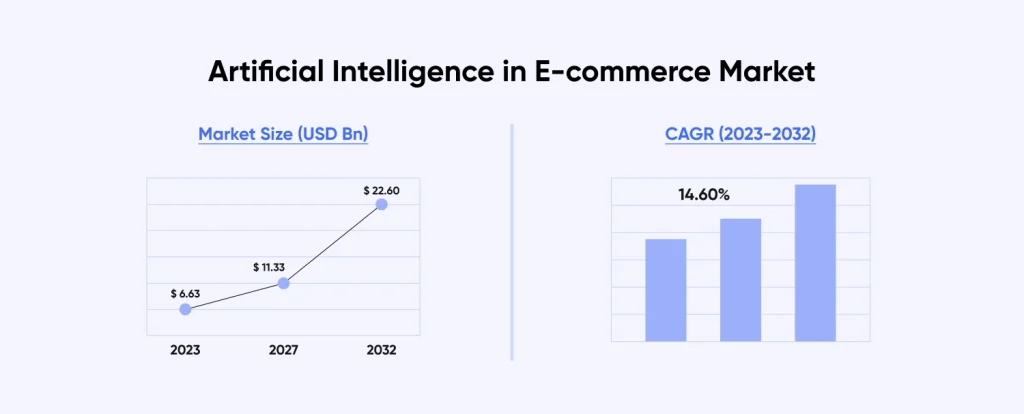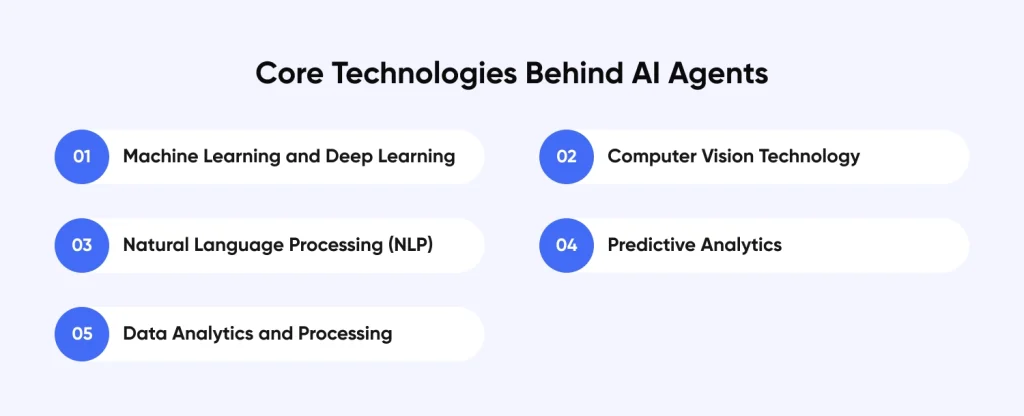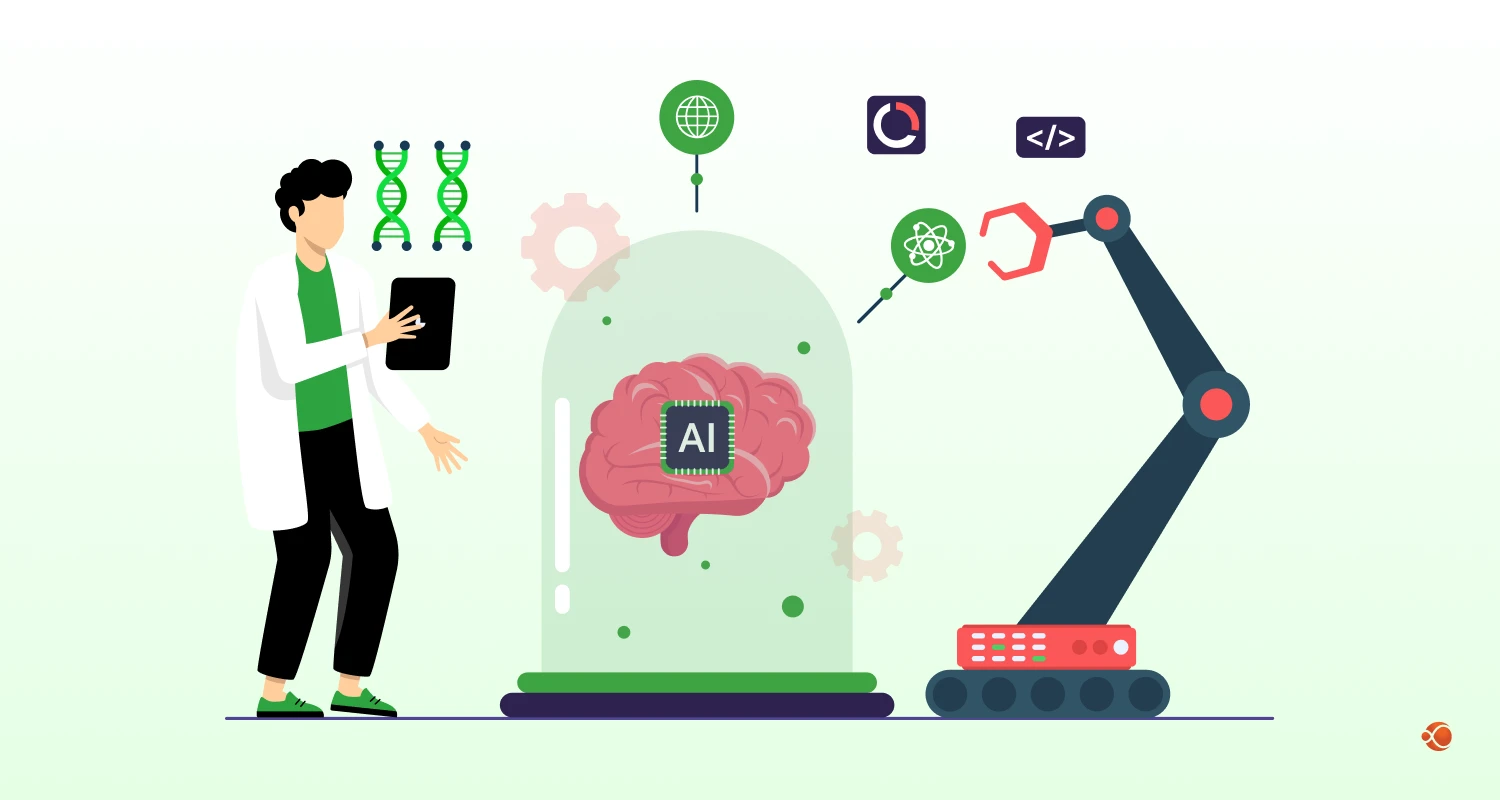Digital shopping has evolved noticeably, with AI agents for online shopping leading this transformation. Such intelligent agents are reshaping how we discover, evaluate, and purchase products online. The global AI in e-commerce market size has exceeded USD 6.63 billion in 2023 and is estimated to reach around USD 22.60 billion by 2032, rising at a CAGR of 14.60% from 2023 to 2032.

Modern consumers expect a personalized experience that understands their preferences instantly. AI shopping assistants deliver exactly this by analyzing customer behaviour, providing customised recommendations, and predicting needs. This ground-breaking shift is more than a technological advancement; it’s a complete reimagination of digital commerce that puts intelligent automation at the center of every shopping journey. The technology creates a smooth experience that’s natural and intuitive.
In this blog, we’ll explore how AI agents are changing the whole shopping experience, the benefits to customers and retailers, along with the future trends and opportunities.
What Are AI Shopping Agents?
AI shopping assistants are sophisticated software programs developed to enhance the online shopping experience through intelligent automation. These systems use ML(machine learning) algorithms to understand customer preferences and behaviour patterns. They operate 24/7, providing instant response and personalized recommendations that human customer service representatives can’t match at scale.
Virtual shopping agent technology combines natural language processing with predictive analytics. This combination allows such systems to understand customer queries in natural languages while predicting future purchasing behaviour. The result is a more intuitive and efficient shopping experience that feels personal and responsive. Intelligent shopping bots represent the most advanced form of these systems. They can handle complex customer interactions, process multiple data points simultaneously, and learn from every interaction.
Type of AI Agents for Online Shopping
| AI Agent Type | Key Features |
| Conversational Chatbots | 24/7 availability, natural language understanding, multi-channel support |
| Recommendation Engines | Behavioral analysis, collaborative filtering, and real-time updates |
| Virtual Shopping Assistants | Personal preferences, budget optimization, and multi-platform coordination |
| Price Monitoring Agents | Real-time price tracking, competitor analysis, and demand forecasting |
| Inventory Management Agents | Demand prediction, stock level optimization, and automated reordering |
| Visual Search Agents | Image recognition, visual similarity matching, AR integration |
Conversational AI Chatbots
AI chatbots for online shopping are the most common type of AI agents in e-commerce. These systems can handle customers’ inquiries, guide users through purchasing processes, and provide product information. Advanced agents maintain conversation context across multiple interactions and can escalate complex issues to human agents when necessary.
Recommendation Engine
Intelligent shopping bots focus on product recommendations and analyze customer behaviour to suggest relevant items. Such a system uses content-based filtering, collaborative filtering, and hybrid approaches to deliver personalized product suggestions. They consider factors like purchase patterns, browsing history, and similar customer patterns.
Price Monitoring
Specialized AI agents monitor prices across multiple retailers and platforms. They alert customers to price drops, compare similar products from different vendors, and find the best deals available. Such AI agents help customers in making informed purchase decisions while maximizing value for money.
Virtual Personal Shopping Assistants
Virtual shopping agent technology provides complete shopping guidance throughout the entire customer journey. AI assistants help customers in navigating product catalogs, finding deals, comparing features and coordinating purchases across multiple platforms. They act as personal shopping consultants, understanding individual style preferences and budget constraints.
Inventory and Supply Chain Agents
AI agents manage inventory levels, predict demand patterns, and optimize supply chain operations. These AI systems ensure product availability while minimizing carrying costs. They coordinate with distribution centers and suppliers to maintain optimal stock levels across different locations.
Visual Search and Recognition Agents
AI in online shopping includes specialized agents that can process visual information to help customers find products. These systems can find items from uploaded photos, suggest similar products based on visual characteristics, and enable augmented reality try-on experiences.
Core Technologies Behind AI Agents

1. Machine Learning and Deep Learning
Modern AI in eCommerce relies on machine learning algorithms that can process huge amounts of customer data to find patterns and preferences. Such systems continuously learn from user interactions, improving their accuracy and effectiveness over time. Deep learning networks understand complex relationships between products, purchasing behaviours, and customer preferences and enable more sophisticated decision-making capabilities.
2. Computer Vision Technology
Computer vision enables AI systems to analyze product images, visual search capabilities, and automated product tagging. This technology processes visual data to find products, patterns, colors, and styles from customer-uploaded images. Advanced computer vision systems can even detect emotional responses through facial recognition, helping optimize product presentation.
3. Natural Language Processing (NLP)
NLP technology enables AI applications in eCommerce to understand and respond to customer queries in conversational language. Advanced NLP systems can interpret context, sentiment, and intent behind customer messages. This capability allows AI agents to engage in meaningful conversations that feel natural and helpful rather than robotic or scripted.
4. Predictive Analytics
Predictive analytics systems forecast future customer behavior, market trends, and demand patterns. These technologies analyze historical data combined with real-time inputs to predict what customers are likely to purchase next. This capability enables proactive inventory management and personalized marketing campaigns.
5. Data Analytics and Processing
Data analytics platforms provide the infrastructure needed to process real-time information from multiple sources. Such platforms enable AI-powered retail assistants to make instant decisions based on current market conditions, customer behavior patterns, and inventory levels. Real-time processing capabilities make sure that AI responses remain current and relevant.

Key Applications in E-commerce
Personalized Product Recommendations
AI-powered retail assistants are experts at analyzing huge amounts of customer data to suggest relevant products. They consider purchase patterns, browsing history, demographic information, and real-time contextual factors. This complete analysis makes sure that product suggestions feel naturally aligned with customer interest and needs.
Seasonal trends, time of day, device type, and geographic location all influence recommendation accuracy. AI in online shopping systems continuously analyzes these variables to provide suggestions that feel timely and relevant. This level of customisation increases customer engagement and conversion rates.
Customer Service Automation
AI customer service for ecommerce has transformed support operations. These systems can handle routine inquiries, resolve common issues without human intervention, and solve difficult problems. 80% of retail business owners expect to adopt AI automation by the end of 2025.
AI chatbots for online shopping understand context and maintain conversation history across multiple interactions. They can get access to customers’ account information and preference data to give a personalised support experience. This capability helps them to resolve issues more effectively than traditional automated systems.
Dynamic Pricing and Inventory Management
AI in e-commerce enables real-time pricing optimization based on competitor analysis, market conditions, and demand forecasting. These systems continuously monitor thousands of variables to determine optimal pricing strategies that will maximize both sales volume and profit margins.
Demand forecasting algorithms analyze historical sales data, seasonal and external factors like weather or economic conditions. This analysis helps retailers maintain optimal inventory levels while minimizing carrying costs and stockout situations.
Visual Search and Recognition
Advanced AI applications in eCommerce have visual search and reverse image search capabilities that allow customers to find products using images rather than text descriptions. This technology is valuable in home décor, fashion, and other visually driven categories where customers often struggle to articulate their preferences in words.
Augmented reality features enable customers to visualize products in their own spaces before purchasing. Virtual shopping agent technology processes spatial data and product dimensions to create realistic previews of how items will look in customer environments.
Benefits of AI Agents for Online Retailers
Enhanced Customer Experience
The AI chatbots for online shopping help users with quick assistance, reducing wait time and improving customer satisfaction. Such AI agent systems understand context and can maintain conversations across multiple touchpoints, creating a smooth experience that feels helpful and natural. Businesses are considering partnering with an experienced AI software development service to ensure proper integration and optimization to use these technologies.
Increased Sales and Conversion Rates
AI in online shopping directly impacts revenue through improved conversion rates. Intelligent chatbots reduce cart abandonment by addressing customer concerns and personalised recommendations increase average order values. These improvements result in measurable revenue increases within months of implementation.
Operational Efficiency
Benefits of AI agents in online stores extend beyond customer-facing improvements. Such systems automate optimize inventory management, routine tasks and provide valuable information for strategic decision making. This automation helps human employees to focus on more complex, strategic activities and creativity.
Data-Driven Insights
AI systems continuously collect and analyze customer interaction data, providing valuable insights into shopping behavior, preferences, and trends. This information helps retailers make informed decisions about product assortment, marketing strategies, and operational improvements.
Implementation Strategies for AI Agents in E-commerce
Choosing the Right AI Solutions
Retailers evaluate specific needs before selecting AI technologies, considering both ongoing maintenance and initial costs. Intelligent shopping bots require ongoing training, making AI a long-term investment. Specialists in Generative AI in eCommerce can provide essential expertise for successful deployment.
Integration with Existing Systems
Successful AI implementation requires seamless integration with e-commerce platforms, CRM systems, and inventory tools. API compatibility ensures secure data flow without performance issues, while staff training helps employees collaborate effectively with AI systems.
Training and Optimization
AI systems need ongoing training through new data feeds, performance monitoring, and algorithm adjustments. Key metrics include recommendation accuracy, customer satisfaction, and conversion rates. Quality data governance is critical since poor data significantly impacts AI performance.
Companies looking to hire AI developers for system optimization should focus on experts with experience in continuous learning algorithms and performance tuning.
Security and Privacy Compliance
AI implementations must give priority to customer data protection and comply with regulations like CCPA and GDPR. Retailers should implement access controls, encryption, and data anonymization practices. Regular security audits help in finding vulnerabilities and making sure ongoing compliance with evolving privacy laws.
Scalability and Future-Proofing
AI solutions should be developed and designed to handle growing transaction volumes and expanding product catalogs. Cloud based architectures offer flexibility for scaling resources based on demand. Retailers should choose AI platforms that can adapt to emerging technologies and changing market conditions without requiring complete system overhauls.
Future Trends and Opportunities of AI Agents
Voice Commerce Integration
Voice-activated shopping through AI agents for online shopping will expand integration with smart speakers and mobile devices. AI shopping assistants will handle complex product research and comparisons through natural voice commands. Multi-modal interfaces combining voice, text, and visual elements will create seamless, context-aware shopping experiences.
Predictive Shopping
Advanced AI will predict customer needs before conscious recognition, enabling proactive inventory positioning and automated purchasing for routine items. Behavioral pattern analysis will identify subtle purchase signals based on usage patterns, seasonal cycles, and life events. Intelligent subscription services will automatically adjust delivery schedules and selections based on consumption patterns.
Augmented Reality Enhancement
AI-powered AR will create immersive shopping experiences for virtual product trials, especially valuable for fashion and furniture. Virtual shopping agent technology will process room dimensions and lighting for realistic product previews. Social AR features will enable collaborative shopping sessions with real-time feedback from friends and family.
Businesses planning to build an eCommerce business should consider these emerging AR capabilities an important component of future customer engagement strategies.
Blockchain-Powered Transparency
AI systems will integrate with blockchain technology to provide complete product authenticity verification and supply chain transparency. Smart contracts will automate warranty claims and returns processing, while decentralized AI networks will offer personalized recommendations without compromising customer privacy through distributed data processing.
Why Choose CMARIX for AI-Powered Shopping Agents?
CMARIX delivers cutting-edge AI solutions designed specifically for the e-commerce landscape. Our deep industry expertise and proven success record make us the right partner for businesses ready to transform their online shopping experience and drive measurable results. Hire AI developers to improve your digital transformation.
Custom-Built AI Intelligence
We develop AI agents precisely engineered for your unique e-commerce environment. Our solutions deliver a hyper-personalised customer experience while optimizing conversion rates and building lasting customer loyalty.
Industry-Leading Expertise
Our team brings extensive experience in AI integration across retail sectors, combining technical innovation with market insights to create solutions that consistently drive revenue growth and operational efficiency.
Future-Ready Scalability
Built with growth in mind, our AI infrastructure seamlessly scales alongside your business expansion. Whether you’re handling seasonal spikes or entering new markets, our solutions adapt automatically to meet evolving demands.
Complete Partnership Approach
We provide complete support throughout the AI journey from initial strategy and development through deployment, performance enhancement and ongoing optimization. Your success is our commitment, backed by continuous innovation and dedicated support.
Conclusion
AI agents for online shopping represent the future of digital commerce, offering unprecedented opportunities for both customers and retailers. Such intelligent systems create more efficient, personalized and satisfying shopping experiences while driving measurable business results.The transformation extends beyond simple automation to encompass genuine intelligence that enhances human decision-making and creates emotional connections between brands and customers.
Retailers who use these technologies now will gain competitive advantages in the evolving digital marketplace. The integration of AI in retail solutions enables businesses to understand customers’ needs more deeply and respond more effectively than ever before. For businesses ready to transform their online presence, investing in professional eCommerce Software Development ensures successful AI implementation that delivers real value to customers and sustainable growth for the business.
FAQs of AI Agents for Online Shopping
How Do AI Shopping Assistants Personalize Recommendations?
AI systems analyze purchasing patterns, browsing history and demographic data to suggest relevant products. They use machine learning(ML) algorithms to continuously improve recommendation accuracy based on customer feedback and behaviour.
Are AI Chatbots Effective for Customer Service?
Yes, AI chatbots handle routine inquiries instantly and resolve common issues without human intervention. They escalate complex problems to human agents when necessary, improving both efficiency and customer satisfaction.
What’s the ROI of Implementing AI in E-commerce?
Most businesses see improved conversion rates and increased average order values within months of implementation. The exact ROI depends on implementation quality, business size, and specific use cases, but typically ranges from 15-30% improvement in key metrics.
How Do AI Systems Protect Customer Privacy?
Modern AI systems use data anonymization, encryption, and secure processing techniques to protect customer information. They comply with privacy regulations while providing personalized experiences through aggregate data analysis.
What Are the Challenges Faced During Implementing AI for E-commerce?
The key challenges include integration complexity, data quality management, and ongoing optimization requirements. Successful implementation requires proper planning, technical expertise, and commitment to continuous improvement.







